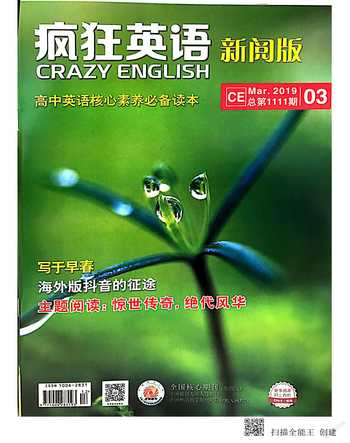Grow plants without soil美国农民玩起了“鱼粪种菜”
朱欣

蔬菜不生长在土中,而在水中栽培,你想象过吗? 一个漂亮的玻璃鱼缸,一棵绿油油的水培植物,再来几条活泼的小鱼,生态水培技术你也可以拥有。
早在几年前,美国的一位女士竟然就开始在家中建造这样的生态水培系统了,让我们一起来看看她都做了什么吧!
扫码听测
Ⅰ.听力理解
听下面一段录音并从题中所给的A、B、C三个选项中选出最佳选项,本题考查重点是学生对意义的理解能力和信息获取能力。
1.What is the advantage of aquaponics mentioned in the article?
A.It is a way to grow plants without soil.
B.It can eliminate the problem of food shortage.
C.Aquaponics is a way to increase world food supplies and reduce climate change.2.Which of the following statements is true?
A.Supporters see aquaponics as a way to eliminate food shortage.
B.Aquaponics is to produce vegetables and fish in different closed systems.
C.Internet is helping aquaponic gardeners connect and learn from one another.
Ⅱ.聽写练习
一边听录音一边阅读以下文字材料,这些材料不是录音的全部内容,而是以提纲、摘要、笔记、图表等形式再现的录音的主要内容,需要补全的内容一般是录音中的关键信息。注意一空一词。
1.Aquaponics is the idea of __________ vegetables and fish in the same closed system.
2.Aquaponics is a way to grow plants without__________.
3.Supporters see aquaponics as a way to reduce climate change, groundwater __________and overfishing.
4. __________ is helping many aquaponic gardeners connect and learn from one another.
文本解说
美国的一位女士开始在家中建造生态水培系统,这个系统不仅不会对环境造成污染,还可以节约资源。
Aquaponics(鱼菜共生技术) is the idea of producing vegetables and fish in the same closed system. It combines aquaculture(水产养殖), or fish farming, with hydroponics(水培), a way to grow plants without soil. Supporters see aquaponics as a way to increase world food supplies and reduce climate change, groundwater pollution and overfishing.
Ms Bernstein grew plants in water with a chemical fertilizer for years. Then she discovered she could use waste water from fish to grow organic vegetables and fruit.
“Honestly, I was very skeptical and just couldn't believe that something as simple as fish waste could become a complete fertilizer. So I had to actually see a system that was in a friend's basement. But when I did, it changed my life.” That was three years ago. Ms Bernstein built her first system with her son outside her home in Boulder, Colorado. Her plants grow in containers. There are no weeds in her aquaponics garden, and no need to worry about watering. “I, just this morning, pulled four radishes
(萝卜) and some lettuce(生菜) for lunch. In my greenhouse right now, I grow all sorts of herbs, tomatoes, peppers.” Ms Bernstein started her own business called the Aquaponics Source. She has a YouTube channel, teaches aquaponics at the Denver Botanic Gardens and recently published a book.
Aquaponics farmer James Godsil says the Internet is helping many aquaponic gardeners connect and learn from one another. Three years ago, Mr Godsil helped create an aquaponics farm in Milwaukee, Wisconsin, called Sweet Water Organics. In twenty?鄄ten, he helped establish a foundation.
“The Sweet Water Foundation was dedicated to democratizing(使民主化) and globalizing the information and the methodologies required to advance this very Earth-friendly food production system, which, by the way, only uses about ten percent of the water normal farming does, and uses no pesticides. It's all natural.”
Mr Godsil is traveling to other countries to teach aquaponics.“I was asked to go to Venezuela this March. And I'm working with people who have a project in Ecuador. I'm
working with people in the Congo and Uganda and Tanzania.”
Subra Mukherjee is with a group in Kolkata, India, called the Society for Appropriate Rural Technology for Sustainability. The group is working with the foundation to develop aquaponics in a community in West Bengal with poor soil conditions for growing food.
Ⅰ.Important vocabulary in the text
1.combine v.聯合;结合
2.actually adv.实际上;事实上
3.container n.集装箱;容器
4.recently adv.最近
5.foundation n.基础;基金会
6.dedicated adj.专心致志的
7.appropriate adj.恰当的;合适的
Ⅱ.Complete the following sentences in correct forms with the vocabulary given above.
1.I can assure you that _______ action will be taken.
2.The earthquake shook the _______ of the house.
3.He has _______ been promoted to assistant manager.
4.I'm not joking. Those were his_______ words.

